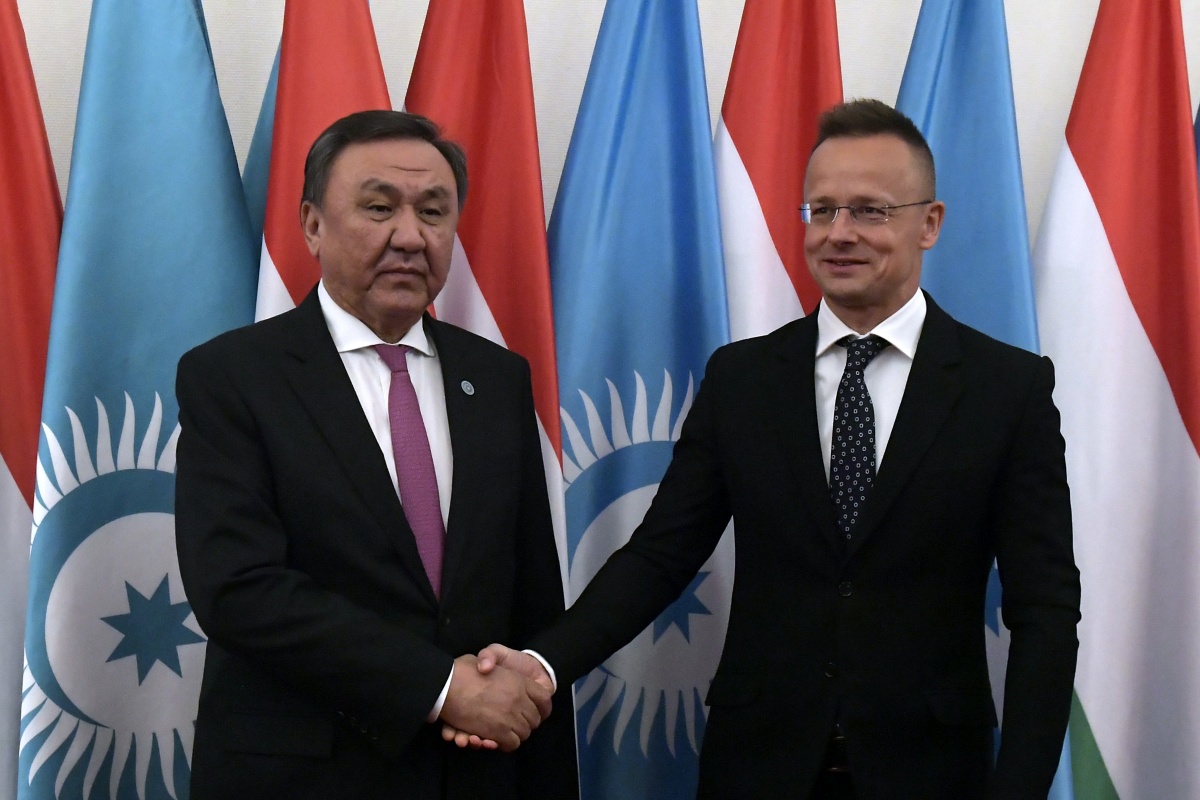
Péter Szijjártó reiterated Hungary's commitment to strengthening cooperation between the EU and the OAS.Continue reading

Hungarian Prime Minister Viktor Orbán on Saturday called the Organization of Turkic States (OAS) a vital pillar of East-West cooperation in Azerbaijan, where he took part in an informal summit of the organization in Shusha.
Speaking about Hungary’s six-month presidency of the Council of the European Union, Viktor Orbán stressed that it was seen as a mission of peace, recalling his trips to Kyiv and Moscow. The prime minister described the city of Shusha in Nagorno-Karabakh, returned to Azeri control in November 2020, as a hopeful sign of peace for Hungary, which, he said, has been living in the shadow of the war in Ukraine for two and a half years.
The Hungarian prime minister paid tribute to Azeri President Ilham Aliyev for giving hundreds of thousands of people in the Caucasus region the chance of a peaceful life.
We hope that we will soon find the same path in Europe,”
he underlined.
Speaking about the European Parliament elections in June, he said that it was a real political earthquake. The prime minister noted that in 20 out of 27 EU member states, people voted for change. He pointed out that some pro-war governments had been toppled or significantly weakened. In this context, he also spoke about the formation of a new party group, Patriots for Europe, that “will be the third strongest group in the European Parliament.”
Mr Orbán drew attention to the danger that the war in Ukraine could lead to a renewed division of the world into power blocs. He said that, in view of the sad historical experience, “we would prefer a vision based on the restoration of integration and global cooperation.” “For this reason,” the Hungarian Prime Minister stressed,
we see the Organization of Turkic States as a vital pillar for maintaining cooperation between East and West.”
Meanwhile, some did not welcome the Hungarian prime minister’s participation in the summit. The High Representative of the EU for Foreign Affairs and Security Policy, for instance, felt the need to clarify that Hungary cannot represent the EU Council at the Azerbaijan summit. Josep Borrell issued a statement on Sunday saying that “Hungary has not received a mandate from the EU Council to advance the relations with the Organization of Turkic States.”
.@PM_ViktorOrban didn’t received mandate from the #EUCO to represent it at the summit of the Organisation of Turkic States.
The EU rejects attempts to legitimise the Turkish Cypriot secessionist entity & recognises only the Republic of Cyprus. https://t.co/vhTfO3IoVe
— Josep Borrell Fontelles (@JosepBorrellF) July 6, 2024
Josep Borrell stated that the fact that Hungary currently holds the rotating Presidency of the Council of the European Union as an EU Member State does not imply that it should represent the Union in external relations. As he said, it is the responsibility of the President of the European Council at Head of State or Government level and of the High Representative of the EU for Foreign Affairs and Security Policy at ministerial level.
Prime Minister Viktor Orbán’s participation at the informal summit of the Organization of Turkic States in Shusha on July 5-6 took place, exclusively, in the framework of the bilateral relations between Hungary and this organization.”
he underlined.
The Hungarian participation was also criticized by the Co-Chairman of the European Conservatives and Reformists Group (ECR) in the European Parliament. Like Mr Borrell, Nicola Procaccini had raised concerns over Mr Orbán’s participation because Ersin Tatar, the leader of the Turkish Republic of Northern Cyprus, was invited to the summit, albeit as an observer.
“His actions undermine the recognition of the Republic of Cyprus and disrespect the national sovereignty of our partners,” said Mr Procaccini. The ECR, which claims to be a center-right political group, has also recently been joined by the notoriously anti-Hungarian ultra-nationalist Romanian party Alliance for the Union of Romanians (AUR), known for organizing deeply offensive protests at a Hungarian war cemetery in Romania, hence Mr Procaccini’s concerns over “disrespecting partners” seemed somewhat selective.
“I am concerned by Viktor #Orban‘s participation in the summit of the Organisation of Turkic States. His actions undermine the recognition of the Republic of Cyprus and disrespect the national sovereignty of our partners. #Patriotism means defending European nations, not… pic.twitter.com/Yt3XmufPNA
— ECR Group (@ecrgroup) July 7, 2024
Via MTI, Featured image: MTI/Miniszterelnöki Sajtóiroda/Benko Vivien Cher